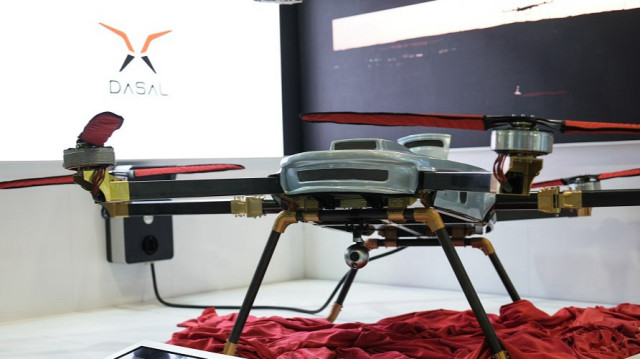
DASAL debuts heavy-class electric-powered PUHU C100 cargo drone at Istanbul defense fair
Turkish defense company DASAL unveiled its indigenously developed unmanned aerial vehicle (UAV), the PUHU C100, at the International Defense Industry Fair (IDEF 2025) in Istanbul this week.
A subsidiary of Turkish defense firm Altınay, DASAL unveiled the PUHU C100 as a heavy-class, electric-powered cargo drone designed to address critical battlefield logistics.
The PUHU C100 cargo UAV features a payload capacity of up to 100 kilograms, a long operation range, and high horizontal speed. Its next-generation rotary-wing system enables the delivery of key materials to target areas without landing via its autonomous hooking unit, mission planning, and optimal route determination capabilities.
Murat Koc, general manager of DASAL, told Anadolu that the cargo UAV PUHU C100 was designed with Türkiye’s logistical needs, the country’s army, and its allied countries in mind, to be operated fully autonomously, especially in challenging regions.
“We developed and delivered Türkiye’s only unmanned, heavy-class cargo drone, which is now in the Turkish Armed Forces’ inventory,” he said. “The PUHU C100 project was made possible with the experiences and resources we gained through the PUHU C75 system — the two vehicles offer different technical advantages depending on deployment.”
According to Koc, while the PUHU C75 features a removable, interchangeable battery, the PUHU C100 uses a fixed battery that can be recharged at electric vehicle (EV) charging stations.He noted that this setup enhances practicality, system reliability, and reduces weight.
“The standout features of our next-generation UAV PUHU C100 are its operational range of up to 35 kilometers (21.75 miles), its ability to operate continuously between designated routes while recharging at the destination, its operational altitude of up to 3,000 meters (a little over 9,800 feet), and its easy use in difficult, mountainous terrain,” he said.
Koc emphasized that DASAL has come a long way, now making one of the few products in the world capable of performing near flawlessly in real combat environments.
“We integrated our completely original-made autopilot and navigation subsystems into the product, which we developed by combining interference-resistant antennae, global and local navigation systems, image-powered navigation, and various other systems,” he said. “The greatest advantage we have is that our systems were approved in the operational environments with the Turkish Armed Forces and Türkiye’s Defense Industry Agency (SSB).”
Koc stated that it took DASAL four months to draw up the concept of the system and take it out for its first flight. “This could be a world record,” he said.
Koc also noted the challenges of sourcing components, explaining that lead times of 12–16 weeks for individual parts led DASAL to design nearly all components in-house.
“We have around 15 years under our belt developing UAVs, and since the very beginning, we’ve been responsible for the structural design, avionics, software, and all electronic components of the systems we made, using our own resources, which made it so that our solutions are end-to-end integrated,” he said.
The PUHU product line was designed to complement itself across various use cases, Koç said, emphasizing that only a handful of companies worldwide can match DASAL’s offerings in the heavy-class electric-powered UAV sector.
“Our approach makes it possible to make these systems operational in such short notice,” he noted.
He highlighted that there is growing interest from around the world in DASAL’s offerings.
“There is significant interest from Western countries in our products and we’re seeing strong demand for partnerships, collaborations, and joint product developments — we’re looking forward to solidifying these via various contracts and agreements at the IDEF 2025,” he added.







